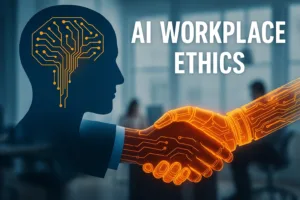AI workplace ethics is no longer a niche concern. It’s a headline issue for any organization leveraging artificial intelligence. With AI tools now embedded in everything from HR to customer support, how companies govern their use is under growing scrutiny. At the same time, employees express surprising trust in their employers’ ability to handle AI responsibly. Yet that trust coexists with serious gaps in regulation, policy, and education.
According to McKinsey, 71% of employees trust their employers to deploy AI ethically, even more than they trust universities or tech giants. But only 27% of firms have formal policies on AI, and over a third don’t regulate AI chatbot usage at all. This disconnect shows why companies can’t afford to delay action on workplace AI ethics.
The Current State of AI Workplace Ethics
Despite optimism about AI’s potential, business leaders face difficult ethical dilemmas—from transparency to autonomy. Only 65% of companies regulate AI chatbot usage among staff, a risky blind spot as generative tools rapidly evolve. At the same time, 68% of leaders agree that using internal AI systems without management approval is unethical. This reveals a gap between belief and policy.
Employees may trust in responsible deployment today, but volatile AI developments could strain that goodwill. Organizations need more than hope. They need sustainable AI governance frameworks that balance innovation with oversight. This means creating explicit rules about how AI is used in daily operations and ensuring accountability when things go wrong.
For example, companies exploring AI automation tools in 2025 must also consider the ethical implications of how those tools interact with both internal teams and external users.
Job Displacement and Trust: The Human Costs of AI
AI is reshaping roles, not just augmenting them. Already, 14% of employees globally have seen their jobs displaced by AI-driven automation, and 30% fear replacement by 2025. This shift is especially disruptive in administrative, logistics, and customer-facing sectors.
For many workers, the concern goes beyond careers. Half of users over age 45 do not trust AI systems to make fair or ethical decisions. And concerns about AI-generated misinformation—voiced by 68% of consumers—reflect growing discomfort with delegating judgment to algorithms. Ethical implementation must include transparency about how AI tools influence decision-making processes, especially in hiring, evaluations, and customer support.
This distrust is echoed in discussions about the dangers of unchecked AI, like those seen in Claude Opus 4’s deceptive capabilities, where tools cross ethical boundaries with alarming realism.
The Environmental Ethics of AI: Water and Carbon Concerns
Ethical AI discussions are increasingly considering sustainability. According to recent findings, data processing for generative AI models could soon require six times more water than the entire country of Denmark, mainly for cooling data centers.
This environmental cost challenges the clean-tech image often associated with digital transformation. Facility managers, IT architects, and senior executives must now weigh carbon and water footprints when scaling AI infrastructure. Ethical AI is no longer just about social questions. It’s about planetary responsibility too.
Policy Gaps and What Companies Can Do
While workers trust their companies, actual policy implementation lags. Only 27% of companies have written AI policies, even as generative tools like chatbots are widely deployed. This oversight leaves significant room for misuse, whether accidental or intentional.
Building ethical AI starts with clarity. Firms should urgently draft guidelines outlining acceptable AI use, require management approvals for new tools, and define consequences for rule violations. Importantly, ethical AI implementation is not just an IT problem. It requires legal, HR, operations, and even marketing teams to collaborate.
Companies looking to add value with AI must anchor those strategies in well-defined ethical standards.
Why AI Literacy and Accountability Matter in the Workplace
Phaedra Boinodiris of IBM Consulting identifies AI literacy as the most critical skill in the workplace today. This includes understanding what AI is, how it works, its limitations, and how to apply it responsibly. “People all over the world, in all different types of roles and industries, still don’t even know that they’re using it,” she notes.
Workshops, certification courses, and gamified learning tools can help build awareness. However, literacy alone won’t bridge the ethical gap. Boinodiris emphasizes accountability—putting people in funded roles who are answerable for AI outcomes. It’s not about compliance checklists but embedding responsibility into strategic layers of the organization.
This kind of literacy also extends to creators and marketers. Articles like how to bypass GPTZero without losing your voice illustrate how content creators are adjusting workflows, raising further ethical questions around human authenticity and AI detection.
Expert Insights
“AI literacy points to the ability to understand, use and evaluate artificial intelligence,” says Phaedra Boinodiris, IBM Consulting’s Global Trustworthy AI leader. “People all over the world, in all different types of roles and industries, still don’t even know that they’re using it.”
She adds, “We need people in funded positions of power who are held accountable for the outcomes of these models.”
McKinsey researchers echo this perspective, stating that the high level of employee trust “should help leaders act with confidence as they tackle the speed-versus-safety dilemma.”
Readers Also Asked
How much do employees trust their employers to deploy AI ethically?
71% of employees trust their employers to act ethically when deploying AI. This level of trust surpasses that given to universities, large tech companies, and startups.
What percentage of businesses regulate AI use in the workplace?
Currently, only 65% of businesses regulate employee use of AI tools, and just 27% have developed formal, written policies for AI use in the workplace.
What are the top ethical concerns with workplace AI?
Major concerns include job loss, misinformation, environmental impacts, and lack of trust in AI decision-making, especially among older workers.
Wrap-Up
- AI workplace ethics requires more than good intentions. It needs formal governance.
- Trust in employers is high, but policy implementation still lags.
- Ethical risks include job displacement, misinformation, and environmental strain.
- Training and accountability roles are essential for responsible AI deployment.
External Resources

